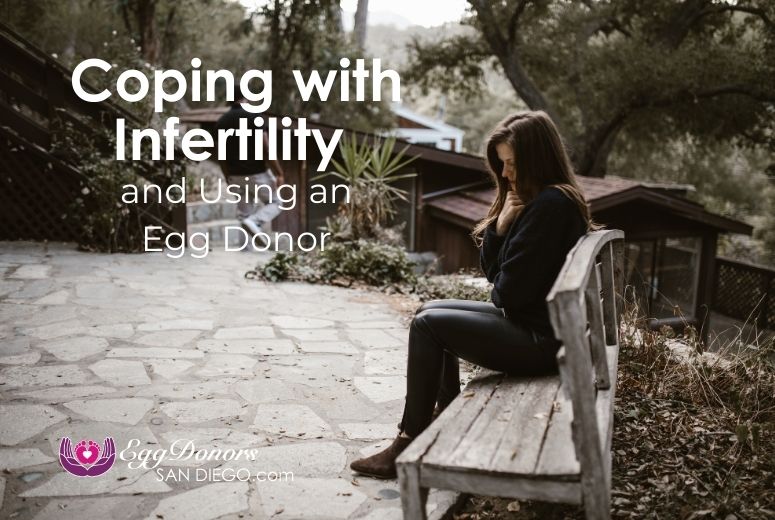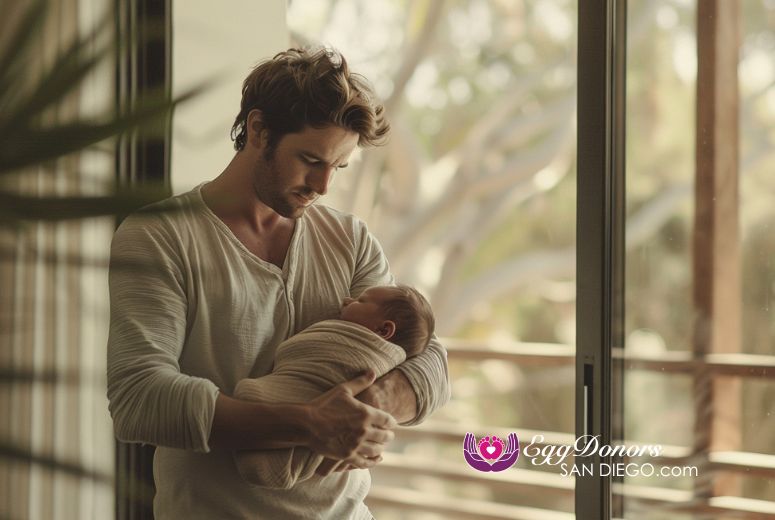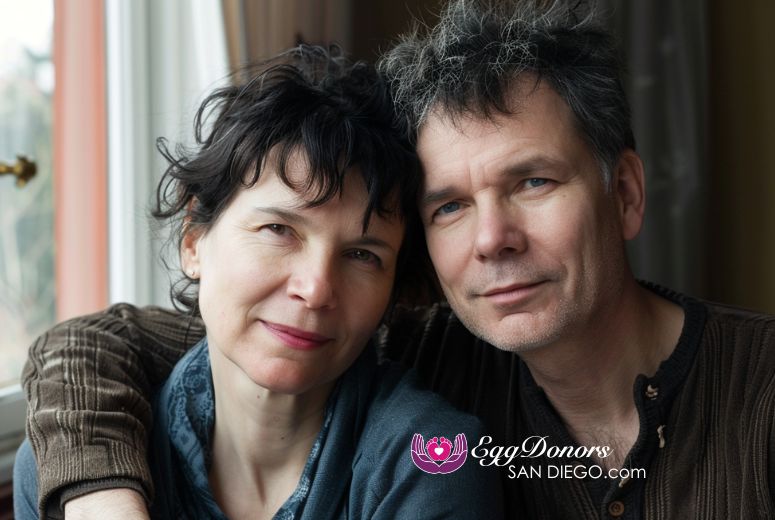Infertility is an emotional and often overwhelming journey that affects individuals and couples across all family structures, including single women, heterosexual couples, and gay men. For many, using an egg donor becomes a vital pathway to parenthood, yet the psychological and logistical challenges can feel daunting. Understanding the process, seeking emotional support, and adopting proactive coping strategies are essential for navigating this journey with resilience and hope.
Defined: What It Means to Use an Egg Donor
Egg donation is an assisted reproductive technology (ART) where eggs from a donor are retrieved, fertilized, cultured in the laboratory to a blastocyst stage of development and cryopreserved. The embryo is later transferred to a recipient or surrogate’s uterus, through IVF with donor eggs. This method provides an opportunity for individuals facing ovarian insufficiency, advanced maternal age, absence of ovaries, or genetic concerns to achieve pregnancy. Using an egg donor is a scientifically advanced yet deeply personal decision, requiring careful consideration of medical, emotional, and ethical factors.
How the Egg Donation Process Works
The egg donation process begins with selecting a donor, which may include reviewing medical histories, physical traits, and personal characteristics. Once a donor is chosen, they undergo ovarian stimulation and egg retrieval. The eggs are then fertilized in a laboratory using the intended parents or donor sperm, followed by embryo culture and cryopreservation of the embryo. Later the embryo is transferred to the prepared uterus of the intended parent or a surrogate’s uterus. Each step is meticulously monitored to maximize donor egg success rates and ensure the highest chances of a healthy pregnancy.
Dr. Minoos Hosseinzadeh, Founder and Medical Director of Fertility Institute of San Diego, emphasizes, “Patients benefit most when they are educated about each stage of the egg donor journey. Understanding the science and timing of each step can significantly alleviate stress.”
Why Coping Strategies Are Crucial
Coping with infertility and using an egg donor involves addressing both emotional and practical challenges. Infertility may elicit grief, anxiety, or feelings of isolation. When combined with the complexities of donor egg treatment, the stress can be amplified. Implementing strategies to manage emotional well-being is critical. Stay hopeful—IVF cycles that include egg donation have some of the highest success rates among fertility treatments.
Effective coping mechanisms include:
- Fertility counseling: Specialized therapists guide patients through emotional processing and decision-making.
- Support networks: Connecting with others undergoing similar experiences reduces feelings of isolation.
- Mindfulness and stress reduction techniques: Meditation, yoga, or journaling can alleviate anxiety.
- Education and preparation: Learning about donor egg success rates and the treatment timeline builds confidence and realistic expectations.
Who Can Benefit from Egg Donation
- Women with diminished ovarian reserve or poor egg quality
- Same-sex male couples seeking parenthood
- Single individuals desiring to become parents
- Couples with genetic concerns wishing to avoid passing certain conditions
Regardless of the family structure, understanding the emotional and medical intricacies of the journey helps recipients navigate the process with clarity and purpose.
When to Consider an Egg Donor
- Multiple IVF cycles using the patient’s own eggs have failed
- Ovarian function is compromised due to age or medical conditions
- Genetic risk factors necessitate donor eggs for a healthy pregnancy
- Absence of eggs, due to gender, surgery, or born without functional ovaries
Proactive discussion with a reproductive endocrinologist ensures patients make informed decisions aligned with their family-building goals.
Symptoms and Emotional Challenges
- Persistent anxiety
- Relationship tension
- Feelings of loss of control
- Difficulty managing expectations during treatment cycles
Acknowledging these responses and seeking support is integral to maintaining mental health throughout the fertility journey.
Causes and Risk Factors
Infertility arises from multiple biological and lifestyle factors, including diminished ovarian reserve, uterine conditions, male-factor infertility, absence of eggs, or unexplained causes. Risk factors influencing egg donation outcomes include maternal age, embryo quality, and underlying medical conditions. Individualized treatment plans can mitigate many risks and improve success rates.
Prevention and Emotional Preparation
- Timely fertility assessments for individuals considering parenthood
- Maintaining physical and emotional health during treatments
- Accessing support resources for families using donor eggs
- Pre-treatment counseling to establish realistic expectations
Emotional preparation is equally vital, as managing stress and expectations can significantly influence patient satisfaction and resilience.
Types of Treatment Available
- Fresh donor egg IVF: Fresh donor eggs are retrieved and fertilized with sperm within hours of collection. The resulting embryos are cultured in specialized conditions until they reach the blastocyst stage, then carefully cryopreserved for transfer into a prepared uterus at a later time.
- Frozen donor egg IVF: Cryopreserved donor eggs are thawed in the laboratory before fertilization. The resulting embryos are cultured under specialized conditions until they reach the blastocyst stage, then cryopreserved for transfer into a prepared uterus at a later time.
- Gestational surrogacy with donor eggs: For recipients unable to carry a pregnancy. The earlier cryopreserved embryo is thawed, and transferred into a prepared surrogate’s uterus.
Each treatment type has unique protocols, benefits, and considerations. Personalization by a fertility specialist ensures the optimal pathway is selected for each patient with exceptional pregnancy success rates.
Costs and Financial Considerations
- Donor fees from either an in-house donor database like the one at Fertility Institute of San Diego or from a trusted donor egg bank.
- IVF laboratory procedures
- Medications and monitoring visits
- Optional services such as genetic testing, shipping or hybrid treatment plans
Dr. Hosseinzadeh notes, “Investing in comprehensive, personalized care from start to finish increases the likelihood of success and provides patients with confidence throughout the process.”
Actionable Steps for Coping
- Seek fertility counseling for emotional guidance
- Learn the egg donation process in detail
- Connect with supportive communities
- Discuss all medical and financial considerations with a trusted fertility specialist
- Celebrate milestones and progress to maintain hope
By actively engaging in these strategies, patients can navigate the emotional and practical aspects of the journey with resilience.
FAQ Section
Consider physical characteristics, medical history, personal values, and donor screening results. Personalized consultations with your clinic help make informed decisions.
The process includes donor selection, egg retrieval, fertilization, embryo culture, and embryo transfer, with careful monitoring at each stage.
Engage in counseling, mindfulness practices, and support groups to navigate stress and anxiety effectively.
Yes. Donor eggs often yield higher success rates than traditional IVF due to the selection of young, healthy donors.
Absolutely. Single women, heterosexual couples, and gay couples can successfully build families with donor eggs.









